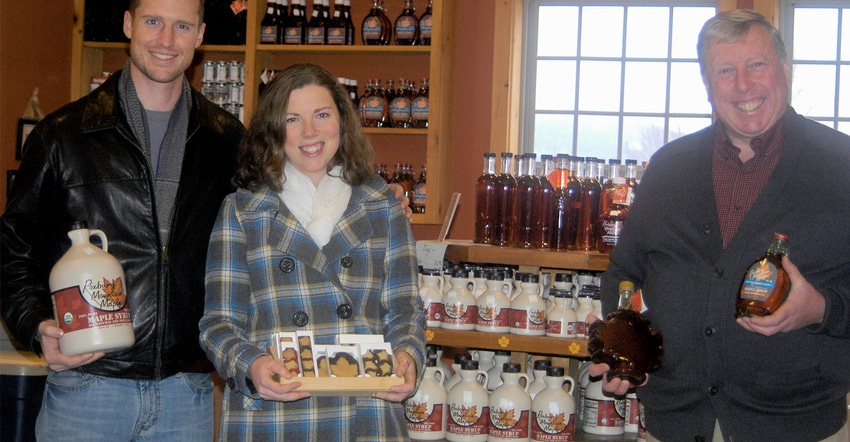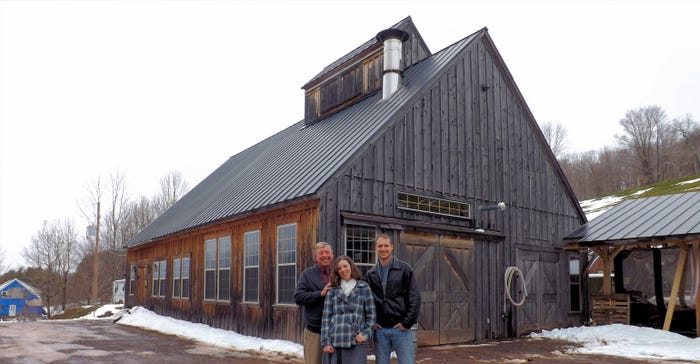February 6, 2017

In 2009, 15-year-old Rebecca Holscher and her dad, Dave, traveled to the Cornell Maple Camp, a beginners school taught by Cornell Maple Specialist Stephen Childs. “We had boiled sap on a woodstove from the maples on our property, so I was interested to learn about small-scale processing,” Rebecca recalls.
At the school, Dave was thinking about relaxation, and brought a paper to read. “But the more I listened, the less I read. Then I took out my calculator,” adds this father of eight with wife Linda. “Steve knew exactly where our land was and called it a ‘gold mine.’”
Father and daughter brainstormed on the drive home, then sat down with the entire family to develop a business and financing plan for Roxbury Mountain Maple. Today, this sugar-making business has a reach far beyond its Catskill Mountains’ home at Hobart, N.Y.
“It was important that the children understood it would be a multigenerational commitment. They were all in,” says Dave.
How the business grew
In 2010, the Holschers built a sugarhouse and plumbed 2,600 taps. Their first syrup earned second-place honors in the 2011 New York State Fair maple competition.
“We sold most of our first syrup in bulk, while Rebecca and Dad experimented with value-added processing. Then, we began developing markets in New York City,” says son Ben, another Cornell maple school “graduate.”

SWEET SUGARHOUSE: While syrup comes into this sugarhouse, the Holschers market value-added products via the web and at retail centers.

“Steve [Childs] invested his time in us as a startup and shared his incredibly valuable knowledge and practical experience as well as exploring the theoretical aspects of what we can do,” adds Rebecca.
At a 2013 maple camp, the trio refined their value-added skills and presented a concern that their 3-year-old pipeline wasn’t producing proper sap volume. “Steve took our elevations, diameters, distances and topography of our woods and determined we had a dam. We changed our main line,” notes Dave. “Production immediately increased 12%.”
Childs’ research helped Roxbury Mountain Maple improve results from its existing infrastructure. As Ben points out, “We can make more syrup more efficiently for less cost.”
Based on Childs’ sanitation trials on replacing droplines to gain higher yield, the Holschers change taps annually. Extensive testing on vacuum and pipelines helped develop an invaluable resource that puts the facts on paper and provides practices that work.
Tapping growing markets
Childs’ lessons on developing markets and brand loyalty were quickly seized by Ben. The family employs web marketing to boost online sales of Roxbury Mountain Maple Cream. Sales grew from 2 pounds per month to more than 300 pounds a month in just one year’s time.
Direct sales are focused on New York City’s Greenmarkets, including those at Union Square and Rockefeller Center. During prime sugaring sales season, Roxbury Mountain Maple sets up at four to five markets weekly.
“Ours is a market-driven plan for healthy growth as a single-source producer,” elaborates Ben. “We’ve not had to adjust our retail pricing based on bulk price since we started.” All the Holscher children, even those married and in different states, participate in the business — from blogging to sales and shipping.
“Dad is the visionary. Ben handles the nitty-gritty numbers and employee relations. I like the practical hands-on work,” summarizes Rebecca, now a college chemistry major with plans for a maple-themed senior thesis. “We have tons of ideas where the business could go.”
With more than 21,000 taps with organic and kosher certification, the business is close to hitting its current five-year-plan goals. The family keeps Childs on their speed dial as they look toward 40,000 taps by 2021.
Childs protests: “The Holschers give me too much credit. They made the effort to get to the trainings and follow up.”
New York Farm Viability Institute funded the first-ever Cornell Maple Camp, plus beginning and expanding maple producer trainings, value-added products research and workshops, plus the tap hole sanitation and tubing system research since 2005, he adds. Childs can be reached at [email protected].
Dunn writes from Mannsville, N.Y.
NYFVI is a farmer-led nonprofit that invests in innovative projects to increase the success of ag production enterprises, protect farm-based natural resources and produce measurable farm-level results. Visit nyfvi.org for more information.
Stock your library with Cornell Maple Program resources
The Holschers have all of the Cornell Maple publications in their family kitchen. The NYS Maple Confection Notebook and NYS Maple Tubing and Vacuum Notebook were an outcome of New York Farm Viability Institute-funded projects. Visit cornellmaple.com to find them and more.
About the Author(s)
You May Also Like




